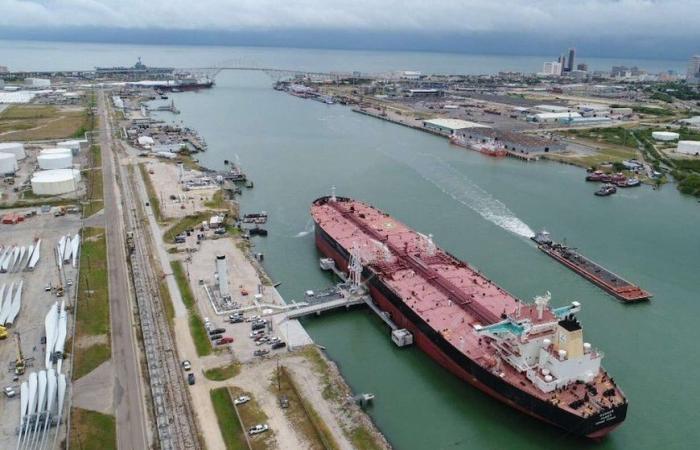Oil and gas shipping is another segment likely to be affected by the new situation in the United States. The return of the former president to the White House was quickly compared to significant changes in sanctions policy towards Russia and Iran. But Trump or not Trump, the oil markets currently have another worry: Chinese weakness.
Trump or not Trump, the oil markets currently have another major concern. He is in the East. Chinese energy imports are in free fall. The second world power, which is struggling to find growth momentum despite the successive launch of stimulus measures to shock its economy, recorded in October the sixth consecutive drop in its arrivals in October, i.e. 44.7 Mt, equivalent to 10 .53 million barrels per day (bpd) compared to 11.53 million in October last year. For the first ten months of the year, the decline reached 420,000 b/d.
In its latest monthly report, OPEC, the organization of oil exporting countries, which always holds back its volumes to keep oil prices as high as possible, revised slightly downwards its growth estimates for black gold. The world is expected to consume 104.03 million barrels per day (Mb/d) in 2024, compared to 102.21 million in 2023. On the other hand, the cartel has reduced demand driven by China to 580,000 bpd, while it expected 760,000 bpd in its July report. Which still seems disproportionate to the reality of Chinese imports (not to be confused, however, with demand, which also includes domestic crude production and variations in stock levels). The imposition of customs duties on China, as envisaged by the future American president, could worsen the economic situation of the second largest economic power in the world.
Depressed activity in China
Concerns about growth in oil demand in 2025 are growing. Until now, the rates of crude and petroleum product carriers remain operated beyond the break-even point although lower than expected. And the weakness of profits in the third quarter is no longer in doubt.
« From a spot rate perspective, the seasonal slowdown has led to downward revisions to third-quarter estimates and a slowdown in the ramp-up of higher rates is hampering fourth-quarter results », says Jefferies. Clarksons, for its part, reduced its estimates for spot rates for oil tankers in 2025 by around 12%, while Evercore ISI revised its estimates downwards by 18%, and by 10% for average suezmax rates next year. and 24% for MR petroleum product carriers.
LNG is struggling
LNG shipping is by far the most suffering with spot rates for tri-fuel diesel vessels at just $20,300 per day ($/d) and $35,000/d for two-stroke engines , down 56% and 42%, respectively. Very far from their five-year average at this time of year, which is around $200,000/day.
The segment is penalized by the influx of deliveries which occurs before the start of liquefaction projects while the default of the typical floating storage activity before winter is sorely lacking.
According to Clarksons, “ LNG tanker rates continue to defy normal seasonality. Despite relatively healthy activity levels, markets in the West [de Suez] are at historic lows and brokers expect further pressure on rates due to oversupply and limited arbitrage opportunities. The market in the East also remains in tension with minimal activities. »
Pressure on Iranian crude
The return of the former president to the White House was very quickly seen as a game changer in the balance of power and ongoing geopolitical tensions: notably a settlement military hand of the war in the Black Sea, the (Houthi) security crisis in the Red Sea and a stricter application of sanctions against Iran, Donald Trump’s favorite enemy.
Barely elected for a first term, Donald Trump denounced the 2015 multilateral agreement signed between Iran and the 5+1 group (Germany, China, United States, France, United Kingdom and Russia). Entering into force at the beginning of 2016, the JCPOA put an end to an old nuclear dispute and was to guarantee the civilian nature of the Iranian nuclear program by subjecting the Islamic Republic to strict control of its activities in return for the partial and progressive lifting of restrictions. international economic sanctions.
Donald Trump of 2017 also banned all business relations and commercial exchanges between the two countries in the field of port operations, maritime transport, shipbuilding and oil trading. Sanctions in force since November 2018.
During his campaign, the Republican repeatedly said that President Joe Biden’s policy of not rigorously enforcing sanctions on oil exports had emboldened Tehran, allowing it to sell its oil to foreign markets, to amass foreign exchange and finance its nuclear activities and its influence through armed militias » [lesquelles est le soutien armé des Houthis, faut-il lire, NDLR].
Iranian crude exports would have reached their highest level in years in 2024, of which China, which does not recognize American sanctions, is the largest customer. According to Reutersciting an Energy Aspects analyst, maximum pressure on Iran could lead to a million barrels per day reduction in its shipments. ClearView Energy Partners, a research group, estimated that 500,000 to 900,000 barrels per day could be taken off the market.
The hypotheses formulated are that by reducing oil flows from this country, exports of Saudi crude would be favored. Another postulate is that Saudi Arabia could tire of ceding market share and start exporting significantly more oil as Atlantic Basin supply simultaneously increases, leading to contango and floating storage. This would then be an advantage for very large oil carriers, VLCCs with a capacity of more than 2 million barrels.
Relief from Russian sanctions?
Speculation further lends the new Trump administration a greater concern for Russian interests. The future president promised to resolve the war in Ukraine even before taking office in January. Information leaked last week to the American press about his famous plan to break the Russian-Ukrainian impasse. According to these revelations, it provides for the creation of a buffer zone whose security would be ensured by European armies with American logistical support.
In return, Volodymyr Zelensky should renounce his integration into NATO for at least 20 years and give up on Crimea. The Ukrainian president is not immune from an agreement cobbled together behind his back between the two presidents who seem to share a certain idea of the world. What the European authorities fear.
The end or easing of Russian sanctions would not necessarily be good news for the tanker market, whose ton-miles have increased with the reconfiguration of oil and gas flows in the wake of the war. The end of the cap on oil prices (ships are authorized to transport crude oil if the price of a barrel is less than $60), could on the other hand deflate the fleet of clandestine ships which has almost tripled in size since the start of the war, to reach 670 units according to divergent data. Sanctions against Russian shipping have been the main driver of second-hand purchases of old tankers.
Finally, European and British sanctions would not be lifted even if the American grip were loosened.
Approche « drill, baby, drill »
According to British broker Braemar, Donald Trump’s “drill, baby, drill” commitment (in short, in favor of oil and gas exploration) will boost production, while the likely increase in the number of sanctioned tankers should reduce capacity supply.
The president, in office on January 20, has not yet clarified whether his customs “taxopathology” would concern crude, which would be detrimental to the margins of American refiners who process imported oil.
Regardless, for most analysts, retaliatory measures will be expected. “ This means that U.S. LNG, like crude oil and coal, could cost more than substitutes, forcing U.S. producers to either cut prices to stay competitive or hope their products aren’t hit with price cuts. customs duties », sums up one of them.
Adeline Descamps
United States-China: heading towards the second trade war
How are freight rates reacting to Trump rhetoric on tariffs?
For dry bulk, customs duties remain a dirty word






